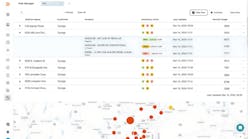The American Trucking Associations (ATA) Executive Committee and the Port of Long Beach (CA) Harbor Commissioners have each approved a settlement negotiated between port officials and ATA and trucking industry representatives. This settlement is based on the motor carrier registration process, referred to as a Registration and Agreement, which will replace the port’s Concession Agreement. The settlement is also expected to end litigation with the Port of Long Beach; however, litigation with the Port of Los Angeles will continue.
Both the Port of Long Beach and ATA emphasized that the new registration apparatus, which includes an agreement by carriers to provide the port necessary operating information, will allow the port to strictly oversee and enforce motor carrier’s compliance with federal, state, and port safety, security, and environmental regulations.
In particular, motor carriers registering to operate at the port must agree to enter all truck and driver information into the port’s Drayage Truck Registry and to equip each truck with a Radio Frequency Identification tag or other technological device to allow the port to monitor and control truck entry to port facilities. Motor carriers must also certify, among other things, that any truck dispatched to the port will comply with all federal, state, and port safety, security, and environmental regulations—including the port’s Clean Trucks Program.
Similarly, motor carriers will acknowledge responsibility for ensuring that all drivers dispatched to the port possess a valid commercial driver license and a Transportation Worker Identification Card. The registration further acknowledges the right of the port to deny entry to any truck or driver that does not meet these regulatory requirements.
The Registration and Agreement also contains a carrier’s acknowledgement that its trucks are subject to inspections while on port property to ensure safety, security, and environmental compliance. Authority of the port to conduct truck safety, security, and emissions inspections of any truck on its property is spelled out in the document. The registration also authorizes the port to gain access to the Intermodal Association of North America’s virtually real-time database to ensure that motor carriers have appropriate insurance coverage.
Port officials believe the new Registration and Agreement provides the port information and authority it needs to ensure compliance with its Clean Trucks Program.








